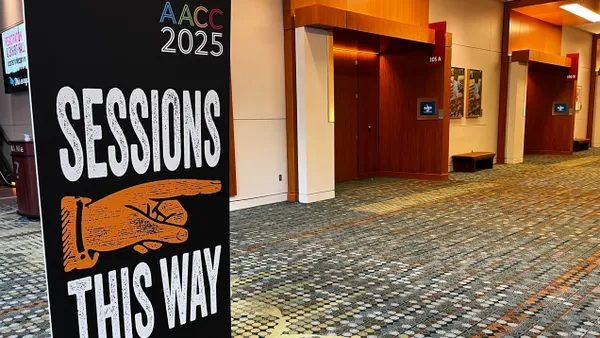Dive Brief:
- Expanding the post-baccalaureate bridge programs available to recent graduates can provide colleges with a long-term way to diversify their faculty, according to an August report from Ithaka S+R, an educational research nonprofit.
- Bridge programs, which offer research opportunities and mentorship, can help talented students from under-resourced institutions gain the skills, financial support and networks they need when applying to graduate school. When designed purposefully, they can increase the number of low-income students and students of color that graduate with doctorates and enter the prospective faculty pool, researchers said.
- But fewer than 300 post-baccalaureate programs are in the U.S., and an overwhelming majority are designed to help bachelor’s degree holders prepare for medical school. The few programs geared toward graduate school in the arts and sciences have very small cohorts and typically fill their ranks with students from prestigious institutions, according to Ithaka S+R.
Dive Insight:
Faculty positions have been largely skewed toward White candidates who grew up in highly educated households. Colleges have worked to diversify the professoriate, but effects have so far been minimal.
"Colleges and universities have been engaged in this effort for over 50 years, and the work is painstakingly slow," said Eugene Tobin, senior advisor at Ithaka S+R and co-author of the August report.
Part of the challenge comes from a lack of students of color who have access to doctorate programs and therefore graduate with the academic credentials expected of most faculty members.
In 2020, Hispanic or Latino students earned 7.4% of all U.S. doctorates, according to the National Science Foundation. For Black students, it was 5.6%. That year, Hispanic or Latino and Black people made up 18.2% and 14.2% of the general population respectively, according to census data.
A post-baccalaureate program designed for students of color and those from low-income backgrounds will narrow the gap between ability and experience, according to the report. Such programs come at a critical juncture in students' pathway to earning doctorates.
Researchers cite four universities that offer prominent post-baccalaureate bridge programs — Harvard University, Yale University, New York University and the University of Pittsburgh.
Each offers graduate-level coursework and courses in research methodology, as well as access to faculty mentorship, research assistantships and the chance to conduct independent research.
They also provide students with financial support through annual stipends, tuition remission, health insurance, laptops and study materials for graduate school entrance exams.
"They have been quite successful in preparing students immediately after their undergraduate career to apply to graduate school," Tobin said. "We're still waiting to see what percentage of those students go on to finish the Ph.D., but the programs are clearly designed to give research experience to students that couldn't get it as undergraduates."
Starting a post-baccalaureate bridge program would likely be too large of an undertaking for a single college, Tobin said. He recommends collaboration between two or more institutions to make such programs scalable.
"Unlike institutions tend to be the best partners," Tobin said. "You can have liberal arts colleges that are expert in nurturing their undergraduates and building community, along with R1 universities whose faculty are expert at preparing the students to go on for careers within the academy."
Many institutions are rethinking how they structure graduate school as a way of adapting to a changing academic job market, Tobin said. Expanding students' post-baccalaureate options can help them diversify their ranks in one fell swoop.














